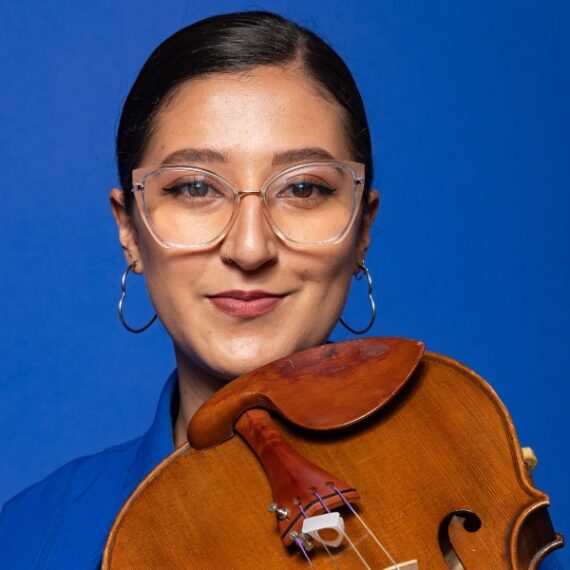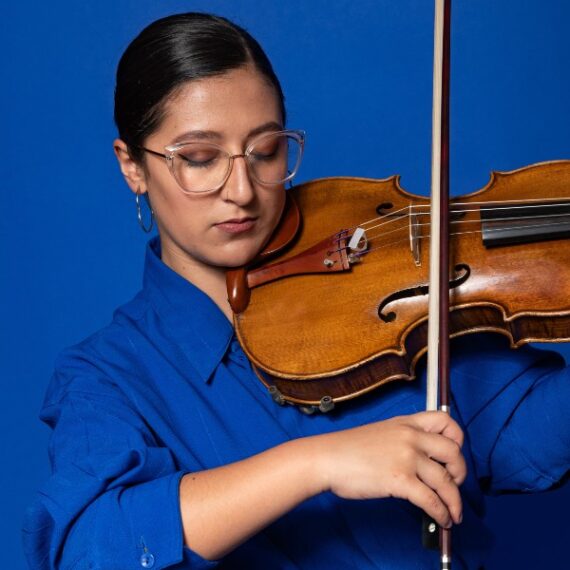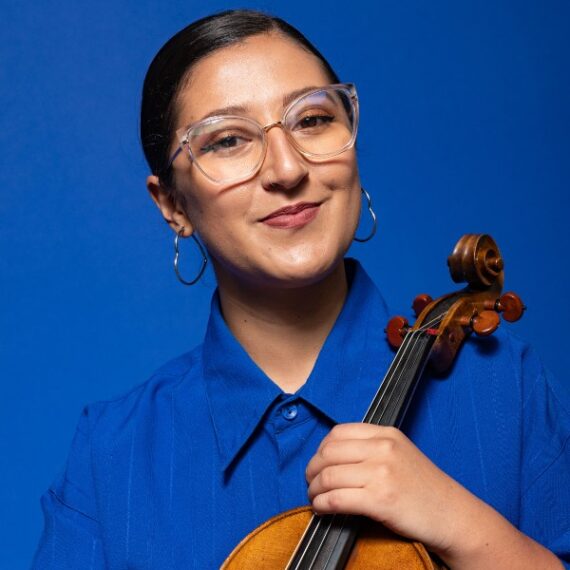Awards/Competitions
Stimulus from the Ministry of Culture within the National Stimulus Plan, 2021; Scholar, Bolivar Davivienda Foundation, 2021 Global Leaders Program #LaJoven; 2019 Latin Grammy Award, Best Classical Music Album, Regreso with Samuel Torres and Nueva Filarmonía Orchestra; Scholar, Salvi Foundation, 2018 Cartagena XII International Music Festival
Appearances
Bogotá Women’s Philharmonic Orchestra, 2022–23; Youth Philharmonic of Colombia, 2020; Youth Philharmonic Orchestra of Bogotá, 2018–22; Nueva Filarmonía Orchestra, 2016–23; Bogotá Symphony Orchestra Foundation, 2014–23; Interviolas Bogotá Festival, Colombia, 2019, 2017, 2015, 2011; International Festival of String Quartets, Colombia, 2014; Pereira Symphonic Festival, Colombia, 2010
What is your earliest memory of classical music?
Happily, my first memory of classical music is hearing a viola in an instrument exhibition at the musical school in my town. That was the first time there were bowed string instruments there, and from that moment on I fell in love with both the viola and classical music.
Was there a teacher who was particularly impactful/helpful? What made this instructor stand out?
There are two women violists who had the most impact on me: Diana Bedoya and Sandra Arango. Diana gave me the strength to believe in my heart’s desire to be a professional violist, and Sandra connected me deeply with my musicality. They both pushed me to do my best and embraced me with their love and support.
What made you decide to become a musician? Was there a particular performance or person that influenced your decision?
In 2010 I was finishing high school and my teacher encouraged me to attend a symphonic festival. That same month I had the fortune of playing with the two most important local orchestras in my region as a youth guest. I played beautiful music, I attended concerts that left me amazed, and I met some music students and professional musicians. Those experiences confirmed my desire to dedicate my life to music.
How did you hear about TŌN? What inspired you to apply?
TŌN was shown as an example of cultural, educational, and management innovation within an executive diploma course that I attended. The program caught my attention immediately, since playing in an orchestra is one of my greatest passions, and by that time I was already finishing my undergraduate degree and wanted to continue my higher studies focused on this passion.
How would you like to see orchestra concerts evolve in the future?
Orchestra concerts do not necessarily have to evolve. Maintaining the musical quality and presenting interesting programs is important, but perhaps everything that exists around the concerts must evolve: looking for ways to be current and generate impact to help the public remain connected with the orchestra, the auditorium, and the music.
What is the most memorable performance you ever had?
The concert “Nueva Filarmonía: Latinoamericana” was in one of the most beautiful theaters in Colombia. It was all original music and the composers were playing their best solos on the congas and the llanera harp. The orchestra was meticulously assembled, the audience was euphoric, and then these two soloists joined in a memorable encore. That day, on that stage, I felt like the luckiest person in the world.
Do you have a favorite non-classical musician or band?
There is a Colombian band called Aterciopelados, they have been my favorite band since I was 9 years old. They are very versatile and I love everything about the lead singer. In 2018 they did a concert with a symphony orchestra that I got to play in—I still can’t believe it!
If you weren’t a musician, what would you be doing?
If I wasn’t a musician, I would probably be teaching at a school, swimming for a living, or running a library or a coffee shop. Or maybe I would just be a lawyer, who knows? I have a variety of different interests.
What is a surprising part of playing your instrument that you think most people don’t know?
Playing viola means constantly teaching everyone (from your family to the stranger in the supermarket) what a viola is.
What is the biggest challenge and/or surprise about playing in an orchestra?
Maybe people might think it is about playing the right notes and being expressive, but it’s actually about looking everywhere in all directions at all times so we can do beautiful things together. Being attentive to everything that is happening in the moment is a real challenge.




